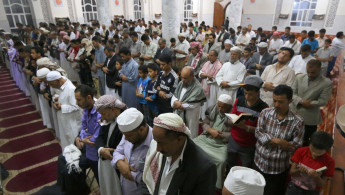Top Islamic authority condemns ban on Ramadan Taraweeh prayers by Yemen's Houthi rebels
Egypt's Al-Azhar religious authority criticised Yemen's Houthi rebels for reportedly preventing worshippers from performing nightly Taraweeh prayers in Ramadan.
2 min read
Yemenis perform Taraweeh prayers in 2015 [Getty]
One of the Islamic world's top religious authorities has condemned Yemen's Houthi rebels for prohibiting worshippers from performing Taraweeh - nightly prayers performed during the Muslim holy month of Ramadan.
"This action comes without regard for the sanctity of religious rituals in the blessed month of Ramadan, or respect for the Sharia [Islamic legal] principles that stipulate respect for the right to worship," the Al-Azhar authority said in a Facebook post.
The Egypt-based Al-Azhar is considered to be one of the highest authorities in Sunni Islam.
The statement followed reports in Yemeni media that armed Houthi rebels were preventing worshippers from performing Taraweeh in mosques in Sanaa, Yemen's capital.
The Yemeni government's Ministry of Awqaf (Religious Endowments) later said in a statement that Houthi rebels had prohibited the prayers in areas of the Yemeni countryside under their control and were partially preventing the prayers "through intimidation" in cities they held.
Responding to Al-Azhar's statement, Houthi leader Mohammad Ali al-Houthi described the Tarawih prayers as "heresy".
Al-Houthi condemned the Sunni religious authority for comparing the prohibition of Taraweeh prayers to that of obligatory prayers.
Most Sunni Muslims believe that Taraweeh prayers are recommended but not obligatory, while most Shia Muslims believe the Ramadan prayers are not permissible in Islam.
Yemen is composed of a majority of Sunni Muslims and a significant minority of Zaydis, a sect of Shia Islam.
The Iran-backed Houthi rebels seized the Yemeni capital Sanaa in 2015. Shortly thereafter, a Saudi-led international coalition intervened on behalf of the internationally-recognized Yemeni government.
Tens of thousands of people have been killed in Yemen's ongoing conflict since then. Millions have been pushed to the brink of famine in what the United Nations has called the world's worst humanitarian crisis.
Follow us on Facebook, Twitter and Instagram to stay connected
"This action comes without regard for the sanctity of religious rituals in the blessed month of Ramadan, or respect for the Sharia [Islamic legal] principles that stipulate respect for the right to worship," the Al-Azhar authority said in a Facebook post.
The Egypt-based Al-Azhar is considered to be one of the highest authorities in Sunni Islam.
The statement followed reports in Yemeni media that armed Houthi rebels were preventing worshippers from performing Taraweeh in mosques in Sanaa, Yemen's capital.
The Yemeni government's Ministry of Awqaf (Religious Endowments) later said in a statement that Houthi rebels had prohibited the prayers in areas of the Yemeni countryside under their control and were partially preventing the prayers "through intimidation" in cities they held.
Responding to Al-Azhar's statement, Houthi leader Mohammad Ali al-Houthi described the Tarawih prayers as "heresy".
Al-Houthi condemned the Sunni religious authority for comparing the prohibition of Taraweeh prayers to that of obligatory prayers.
Most Sunni Muslims believe that Taraweeh prayers are recommended but not obligatory, while most Shia Muslims believe the Ramadan prayers are not permissible in Islam.
Yemen is composed of a majority of Sunni Muslims and a significant minority of Zaydis, a sect of Shia Islam.
The Iran-backed Houthi rebels seized the Yemeni capital Sanaa in 2015. Shortly thereafter, a Saudi-led international coalition intervened on behalf of the internationally-recognized Yemeni government.
Tens of thousands of people have been killed in Yemen's ongoing conflict since then. Millions have been pushed to the brink of famine in what the United Nations has called the world's worst humanitarian crisis.
Follow us on Facebook, Twitter and Instagram to stay connected





 Follow the Middle East's top stories in English at The New Arab on Google News
Follow the Middle East's top stories in English at The New Arab on Google News
![Netanyahu furiously denounced the ICC [Getty]](/sites/default/files/styles/image_330x185/public/2024-11/GettyImages-2169352575.jpg?h=199d8c1f&itok=-vRiruf5)
![Both Hamas and the Palestinian Authority welcomed the ICC arrest warrants [Getty]](/sites/default/files/styles/image_330x185/public/2024-11/GettyImages-2178351173.jpg?h=199d8c1f&itok=TV858iVg)
